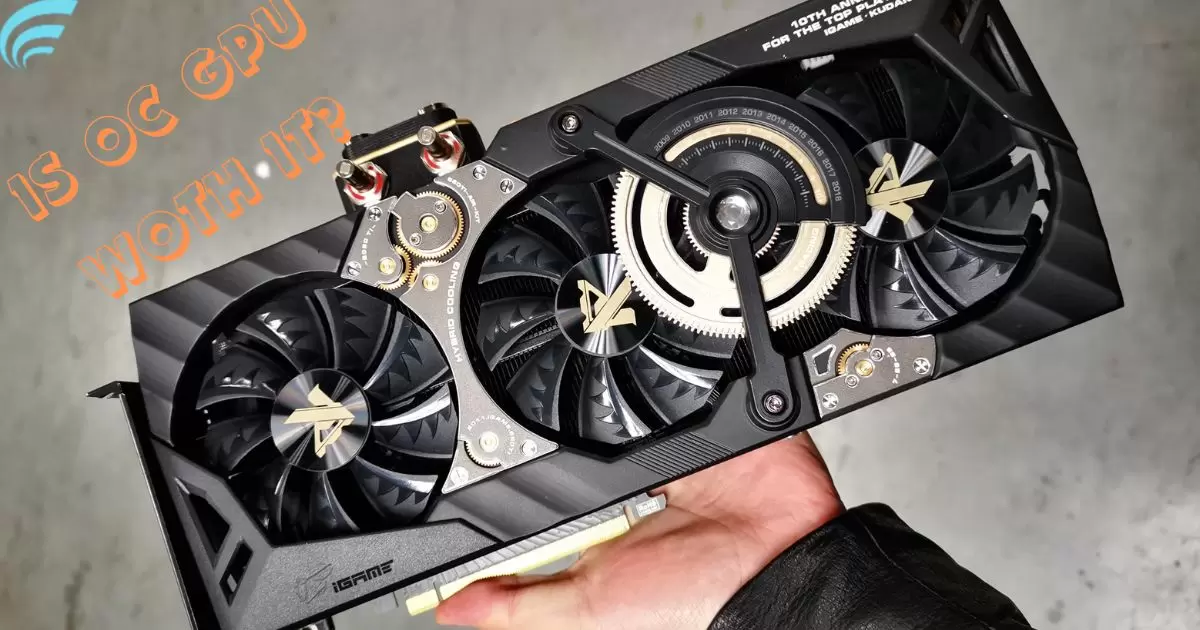An overclocked (OC) GPU refers to a graphics processing unit that has been modified to run at a higher clock speed than its default setting. This tweak boosts the GPU’s performance, allowing it to process graphics faster and enhance overall system speed. However, overclocking generates more heat, so adequate cooling is essential. While it can improve gaming and graphics performance, users should be cautious and monitor temperatures to avoid potential overheating issues.
Curious about turbocharging your graphics performance? Ever wondered: Is OC GPU worth it? Unleash the hidden power of your graphics card with overclocking! Let’s explore whether the potential performance boost is worth the journey. It’s time to dive into the world of overclocking and discover the exciting possibilities for elevating your gaming and graphics experience.
Wondering if overclocking your GPU is worth it? Overclocking can boost graphics performance, making games and applications run faster. However, it comes with risks, such as increased heat generation and potential hardware damage. Before deciding, consider your needs, monitor temperatures, and weigh the benefits against the potential drawbacks to determine if overclocking your GPU is truly worth it for your computing experience.
Understanding GPU Overclocking
GPU overclocking involves tweaking the graphics card’s settings to increase its clock speed beyond the manufacturer’s default. This process aims to enhance performance, making the GPU work faster than intended. While it can lead to improved graphics and gaming experiences, users should tread carefully, as overclocking comes with potential risks.
When diving into GPU overclocking, it’s crucial to understand the underlying principles. The clock speed determines how quickly the GPU processes information, affecting overall performance. Overclocking aims to push this speed limit, but it requires a delicate balance to prevent overheating and potential damage to the hardware.
Performance Gains
One of the primary motivations for GPU overclocking is the promise of performance gains. By pushing the clock speed beyond the default settings, users can experience smoother gameplay, faster rendering in graphic-intensive applications, and improved overall system responsiveness. However, the degree of performance gain varies depending on the specific GPU model and the extent of the overclock.
It’s essential to manage expectations, as not all GPUs respond equally to overclocking. While some users may witness a significant performance boost, others might experience more marginal improvements. Regularly monitoring the GPU’s temperature is crucial during overclocking to ensure that the increased performance doesn’t lead to overheating issues.
Table: Performance Gains with GPU Overclocking
| GPU Model | Average Performance Gain |
| Nvidia GTX 10xx | Up to 15% |
| AMD Radeon RX | Up to 10% |
| Nvidia RTX 20xx | Up to 20% |
Risks and Drawbacks

Despite the allure of performance gains, GPU overclocking comes with inherent risks and drawbacks. The most significant concern is the potential for increased heat generation. Overclocking raises the temperature of the GPU, and without adequate cooling, it can lead to thermal throttling, reducing performance, or even causing hardware damage.
Another drawback is the increased power consumption associated with overclocking. This can result in higher electricity bills and put additional strain on the power supply unit. Users considering GPU overclocking should be aware of these risks and carefully weigh the benefits against the potential drawbacks to make an informed decision.
Considerations for Different Users
The decision to overclock a GPU should align with the user’s specific needs and preferences. Gaming enthusiasts seeking an extra edge in performance may find overclocking appealing, while users engaged in graphic design or video editing may also benefit from the enhanced rendering speeds. However, individuals using their GPUs for standard tasks may not notice a substantial difference and should weigh the potential risks accordingly.
Consideration for different users extends to the type of GPU and its intended use. High-end gaming GPUs may offer more significant performance gains compared to entry-level models. Users should evaluate their GPU’s capabilities, their own usage patterns, and the potential benefits before venturing into overclocking.
Now, speaking of temperatures, a crucial aspect is understanding whether a 53°C GPU temp is good. This moderate temperature generally indicates optimal performance without excessive stress on the graphics card. It’s like maintaining the perfect balance to ensure your GPU operates efficiently, especially during graphics-intensive tasks like gaming or video editing.
Tools and Methods for Overclocking
Several tools and methods are available for users looking to venture into GPU overclocking. Manufacturers often provide proprietary software that allows users to tweak settings within safe limits. Third-party applications, such as MSI Afterburner or EVGA Precision, offer more advanced features for enthusiasts. Regardless of the tool used, users should start with conservative overclocking settings and gradually increase them while monitoring temperatures.
Understanding the tools and methods for overclocking is essential to avoid pushing the GPU beyond its safe limits. Users should familiarize themselves with the specific features of the chosen overclocking software and follow guidelines provided by the GPU manufacturer. This ensures a controlled and monitored approach to achieving the desired performance gains without compromising stability.
Professional Use Cases
While GPU overclocking is often associated with gaming, it has notable applications in professional settings. Professionals engaged in tasks like 3D rendering, video editing, and scientific simulations can benefit from the increased processing speeds offered by overclocking. However, the decision to overclock in a professional setting should be approached with caution, considering the potential risks and the critical nature of professional work.
Professionals should weigh the performance gains against the stability and reliability required for their tasks. Stability is paramount in professional applications, and any potential issues related to overclocking could impact the quality and efficiency of the work. It’s advisable for professionals to thoroughly test and validate the stability of the overclocked GPU before incorporating it into their workflow.
Affordability and Value Proposition
The affordability of GPU overclocking is a significant consideration for users contemplating this enhancement. While software-based overclocking is generally free, users should factor in the cost of additional cooling solutions if needed. High-performance cooling solutions, such as aftermarket graphics card coolers or liquid cooling systems, may incur additional expenses.
Determining the value proposition of GPU overclocking requires evaluating the cost versus the benefits gained. Users on a tight budget may find that the cost of additional cooling solutions outweighs the potential performance gains. It’s essential to strike a balance between achieving the desired performance boost and maintaining a cost-effective approach to GPU enhancements.
User Experiences and Community Insights
Drawing insights from user experiences and community feedback is invaluable when delving into GPU overclocking. Online forums, user reviews, and community discussions provide real-world perspectives on the effectiveness and potential pitfalls of overclocking. Learning from the experiences of others helps users anticipate challenges, optimize their approach, and make informed decisions.
Community insights also serve as a valuable resource for troubleshooting issues that may arise during or after GPU overclocking. Engaging with the user community fosters a collaborative environment where individuals can share tips, recommendations, and cautionary tales. Leveraging the collective knowledge of the community enhances the overall understanding of GPU overclocking and contributes to a more informed and confident user base.
FAQs
What is GPU overclocking, and is it worth considering?
GPU overclocking involves boosting the graphics card’s clock speed for enhanced performance. Whether it’s worth it depends on your needs; gamers seeking more power may find value, but casual users might not.
Can overclocking GPUs improve gaming performance significantly?
Yes, overclocking can lead to notable gaming performance improvements. However, the extent of the boost varies based on factors like the specific GPU model and the game being played.
Are there risks associated with overclocking, and is it worth taking them?
Overclocking carries risks such as potential damage and voided warranties. Deciding if it’s worth the risks depends on your willingness to take precautions and accept the consequences.
Does overclocking affect GPU lifespan, and is it a major concern?
Overclocking can potentially shorten GPU lifespans due to increased stress. Whether this is a major concern depends on how much you value longevity versus immediate performance gains.
Is overclocking worth it for content creators and professionals?
For content creators and professionals, overclocking can be worthwhile to enhance rendering speeds and improve workflow efficiency, provided stability and reliability are maintained.
Conclusion
In the grand scheme of things, the decision to overclock your GPU boils down to one crucial question: Is overclocking your GPU worth it? For avid gamers seeking an extra performance punch, the answer might lean towards a resounding yes, unleashing a turbocharged gaming experience. However, for everyday users or those cautious about potential risks, the benefits might not justify the endeavor.
It’s akin to deciding whether to tune up your car for a speed boost an exhilarating choice for some but an unnecessary one for others. So, when pondering the worthiness of GPU overclocking, consider your priorities, weigh the potential gains against the risks, and tailor your computing adventure accordingly.











